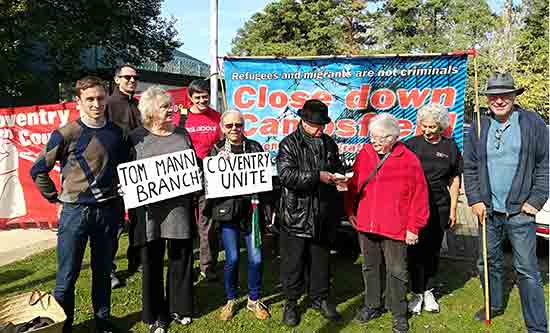
We met Angela at a demonstration in Birmingham in May 2018. The demonstration was held by activists from, and in solidarity with, the African-Caribbean community and was supported by anti-racist organisations including FRFI. The demonstration was called because of the sudden increase in state racism faced by the Windrush Generation (see FRFI 264) as people in Birmingham had their friends and relatives suddenly taken away to immigration prisons or were facing threats of deportation. Angela’s Jamaican-born husband, Mark, had by then been fighting such a battle against Britain’s racist immigration laws for some time. And, as with many people, the battle is not yet over. Mark is currently launching another immigration appeal. They’ve shared their story of struggle and resistance with FRFI to expose the appalling situation faced by many migrants in Britain today.
Mark met Angela, who is British-born, in Birmingham in 2002. In 2003 the Home Office called them to an interview at Birmingham Airport. Angela told us: ‘We was all, including the kids, detained all day in there. From about 8am and I think we came out at about 7 at night. I’d taken some bottles and stuff with me but you think you’re going for an interview, you don’t think you’re going to be in there for nearly 12 hours. So we’d run out of nappies and milk and baby food. I kept complaining and they only offered to get us a sandwich. Now I don’t know many six-week-old babies that would eat a sandwich.’ It was made clear to them that Mark would have been deported then and there if it had not been for a strike by BA workers. This gave them crucial time to launch an initial appeal. Angela and Mark were kept apart from each other all day and were hounded with mundane questions in an attempt to undermine their relationship. ‘They did say to me that I could go back out through security but that if I left they would detain Mark. So what choice did I have really? It was vile.’
The couple recounted many examples of the hostility and racism they’ve faced since then – including the Home Office questioning the legitimacy of their marriage. Angela told us: ‘They [the legal team of the Home Office] stood up in court and accused the marriage of being a sham and asked Mark if he was sure those children was his.’
Despite being given temporary leave to remain in 2006, the family continued to face lies and manipulation from the Home Office. ‘In court in Newport, Wales [2017] they said that they wanted to oppose his bail because he was a “prolific absconder.” He arrived in 2001 and they said that they had no idea where he’d disappeared to and that he suddenly re-appeared in 2009.’ But this was a complete lie. ‘They was fully aware of where we were living. We’d been to Birmingham Airport in that time for the interview. And they’d given him the right to stay for a couple of years in 2006. They were definitely aware of where he was.’
At one point, Mark had to report to a centre in Solihull every week. During one of these routine visits he was suddenly taken to the Campsfield Immigration Removal Centre in Oxfordshire. Angela managed to find out and a judicial review was launched. This helped Mark resist the deportation, despite threats of violence while held in the IRC. Mark described his experience: ‘You were moved round really quickly to wherever they want. Rooms were crowded with four or six people. And there were bed bugs.’ He told us that one fellow detainee was rushed to hospital, suspected of having Legionnaire’s disease. Mark also mentioned that he was asked to do basic jobs for slave wages; roughly £1 a day: ‘They don’t want to pay staff. I was asked to do cooking and cleaning and that sort of thing.’
Mark eventually managed to get out on bail and he and his family, along with other activists, continue to fight the deportation order and the wider forces of state racism. The work they’re doing with other Windrush activists in Birmingham, and their support for the campaign for justice by the family of Kingsley Burrell, murdered by police in Birmingham in 2011, shows that resistance is out there and must continue to be built. It must unflinchingly challenge state racism in all its forms.
Joe Smith
Fight Racism! Fight Imperialism! No 267, December 2018/January 2019




